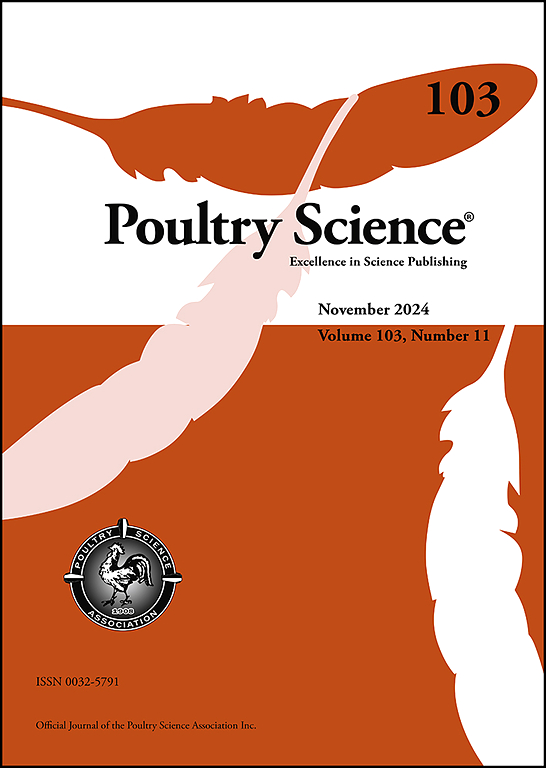Technical note: Sustainable snail meal enhances duck egg production and health
IF 3.8
1区 农林科学
Q1 AGRICULTURE, DAIRY & ANIMAL SCIENCE
引用次数: 0
Abstract
This study evaluated the effects of replacing soybean meal with snail meal on laying performance, egg quality, and blood parameters in laying ducks. Five experimental diets with graded levels of soybean meal replacement by snail meal were formulated: T0 (0% replacement), T1 (25% replacement), T2 (50% replacement), T3 (75% replacement), and T4 (100% replacement). Ducks fed the T2 (50% replacement) diet showed the highest egg production rate (87%), average egg weight (68.0 g), and egg mass (59.2 g/day), along with the lowest feed conversion ratio (2.18). Egg quality also improved, with increased yolk color score (10.0), Haugh unit (86.0), and eggshell strength (4.1 kg/cm²). Serum analysis revealed higher superoxide dismutase (SOD) (85.48 U/mL), glutathione peroxidase (GPX) (148.59 U/mL), and IgG (2.34 g/L) levels in the 50% group, indicating enhanced antioxidant and immune functions. These findings suggest that replacing 50% of soybean meal with snail meal optimizes laying performance and physiological health in ducks, and offers a promising strategy for sustainable protein substitution in poultry diets.
技术说明:可持续蜗牛粉提高鸭蛋产量和健康
本试验旨在评价用蜗牛粕替代豆粕对蛋鸭产蛋性能、蛋品质和血液指标的影响。分别配制5种不同水平的试验饲粮:T0(替代0%)、T1(替代25%)、T2(替代50%)、T3(替代75%)和T4(替代100%)。T2(50%替代)饲粮产蛋率最高(87%),平均蛋重(68.0 g)和蛋质量(59.2 g/d),饲料系数最低(2.18)。鸡蛋品质也有所改善,蛋黄颜色评分(10.0)、哈夫单位(86.0)和蛋壳强度(4.1 kg/cm²)均有所提高。血清超氧化物歧化酶(SOD) (85.48 U/mL)、谷胱甘肽过氧化物酶(GPX) (148.59 U/mL)和IgG (2.34 g/L)水平升高,表明50%组抗氧化和免疫功能增强。由此可见,用蜗牛粕替代50%的豆粕可优化鸭的产蛋性能和生理健康,为家禽日粮中可持续的蛋白质替代提供了一种有前景的策略。
本文章由计算机程序翻译,如有差异,请以英文原文为准。
求助全文
约1分钟内获得全文
求助全文
来源期刊

Poultry Science
农林科学-奶制品与动物科学
CiteScore
7.60
自引率
15.90%
发文量
0
审稿时长
94 days
期刊介绍:
First self-published in 1921, Poultry Science is an internationally renowned monthly journal, known as the authoritative source for a broad range of poultry information and high-caliber research. The journal plays a pivotal role in the dissemination of preeminent poultry-related knowledge across all disciplines. As of January 2020, Poultry Science will become an Open Access journal with no subscription charges, meaning authors who publish here can make their research immediately, permanently, and freely accessible worldwide while retaining copyright to their work. Papers submitted for publication after October 1, 2019 will be published as Open Access papers.
An international journal, Poultry Science publishes original papers, research notes, symposium papers, and reviews of basic science as applied to poultry. This authoritative source of poultry information is consistently ranked by ISI Impact Factor as one of the top 10 agriculture, dairy and animal science journals to deliver high-caliber research. Currently it is the highest-ranked (by Impact Factor and Eigenfactor) journal dedicated to publishing poultry research. Subject areas include breeding, genetics, education, production, management, environment, health, behavior, welfare, immunology, molecular biology, metabolism, nutrition, physiology, reproduction, processing, and products.
 求助内容:
求助内容: 应助结果提醒方式:
应助结果提醒方式:


